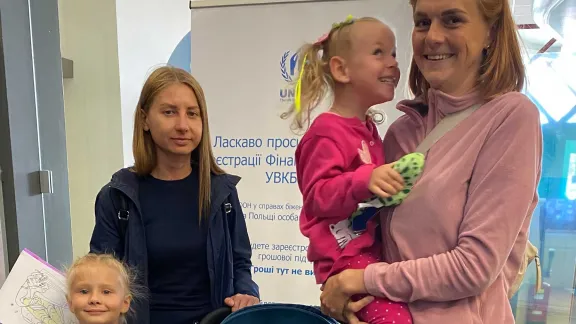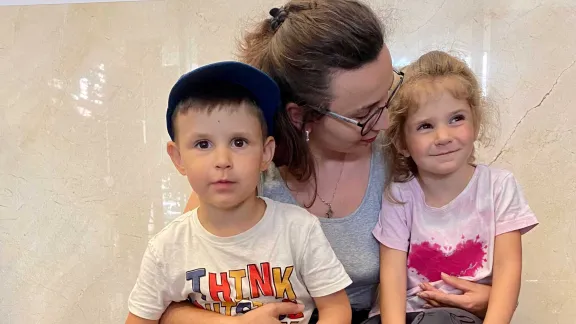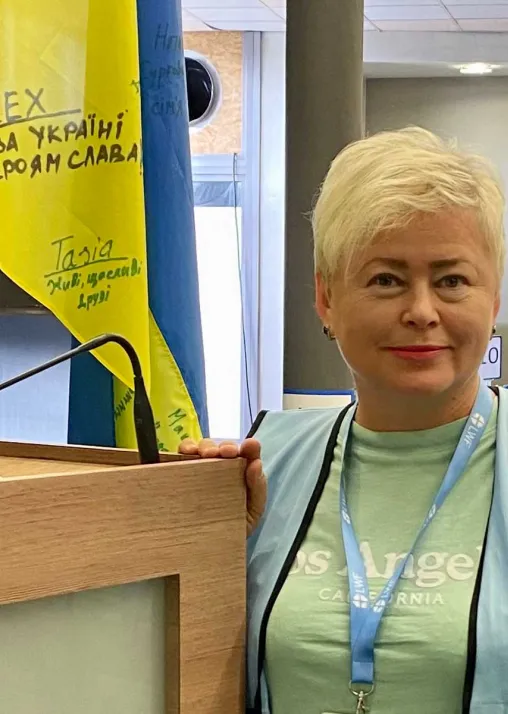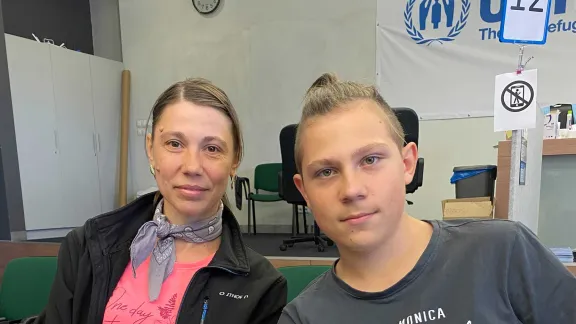LWF cash centers help Ukrainian refugees settle in Poland

Hanna and Olga with their children, in the LWF center in Gdansk. All photos: B. PACHUTA, LWF
(LWI) - Last year at this time, Anastasia was on vacation at the Black Sea. This year, she sees the sea every day, but it is not the same sea, and she is not a tourist here. In early March she fled the war in Ukraine, together with her two children and her mother. Anastasia found a temporary home in Gdansk, Poland. Her husband and father stayed behind to fight for their country.
Anastasia is one of the 60,000 people who receive financial aid through The Lutheran World Federation (LWF) multipurpose cash assistance enrolment centers across the country – with funding coming primarily from the United Nations High Commissioner for Refugees (UNHCR). In the city of Gdansk, at the Baltic Sea, the refugees from Ukraine mix with the tourists who come here for a summer vacation. Their experience, however, is quite different – organizing life under unstable circumstances, the trauma of war and the sole care for children and elderly parents are especially challenging for mothers.
Trauma and homesickness

Anastasia with her children. Photo: B. PACHUTA, LWF
Anastasia and her family were initially taken in by a Polish family, who looked after them very well. The family lived in a small town near Gdansk, but also close to a Polish military base – something Anastasia did not know then. "At the beginning, when we heard the sound of airplanes passing by, we immediately wanted to run away,” she recounts. For the first two months, her children did not understand why they couldn’t go home. They miss their father and their friends.
We only want what people have in peacetime. We want stability and security for ourselves and our children.
– Olga, refugee from Ukraine
Olga’s and Hannah’s children are now asking their relatives, who remained in Ukraine, to send pictures of the places where they used to spend their time – schools, playgrounds, parks. They keep asking to go home. The two women found an apartment, but have to leave it soon. “We don’t know where we will live. We don’t know what to do when the financial assistance ends,” Olga says. “We only want what people have in peacetime. We want stability and security for ourselves and our children.”
"Give us a fishing rod”

Lina, working in the LWF cash assistance center in Gdánsk. Photo: B. PACHUTA, LWF
Loss of stability, a home, and income are reducing people’s self-esteem, says Lina, a medical worker from Ukraine. A Polish family hosted her and her husband and helped them find a job. Lina now works as a psychologist at the LWF center in Gdansk. “Psychological support is very important for people in this situation,” she says. “They feel suspended, between their homes in Ukraine and their new home in Poland.”
Lina has observed that people return to Ukraine “because they do not have the money to pay for an apartment and to afford living here.” In addition to the financial support at the centers, people need psychological support to face their new situation, she says. “Refugees do not come here because they want to, but because they have no other option,” she says. She advocates not losing the potential of the refugees but helping them find jobs in line with their skills and qualifications: “Don’t give us a fish, give us a fishing rod!”
More than 90 percent of the staff that LWF has hired for the centers are refugees themselves, says Allan Calma, LWF Humanitarian Coordinator and Team Leader in Poland for the first five months. "I am deeply humbled and truly inspired to see the determination on the faces of these women who, despite the trauma and challenges they continue to experience, are trying to bring back some normalcy into their lives. It is imperative we heed their call to move away from item provision and do more in supporting refugees in finding gainful employment,” Calma adds.
Resilience

Dina with one of her sons. To support her children, she took a job below her qualifications. Photo: B. PACHUTA, LWF
Many women are highly qualified. Anastasia worked as a human resource manager; Dina worked in a tax office for 20 years. Hanna is a dance choreographer and Olga used to be deputy headmistress of a school, and now teaches online classes. It is mostly the language barrier which prevents them from finding a job in their profession, sometimes also the lack of child care.
Until they have learned enough Polish to work, they now depend on LWF’s support to pay rent for their apartments, buy food and school supplies. Some have also taken a job below their qualifications. Dina, the former tax accountant, now works as a cleaner. “I miss my work in Ukraine and the status I have earned. I have to start all over again,” she says. She sometimes experiences emotional breakdowns, she says, but her children need her. “You have to stand up and move on,” she says.
In Poland, LWF supports Ukrainian refugees through a country program, with six multi-purpose cash assistance centers around the country. LWF runs these centers with the Evangelical Church of the Augsburg Confession in Poland (ECACP), an LWF member church.
LWF is responding to the war in Ukraine also through its local member churches in Poland, Hungary, Romania, and the Slovak Republic. Together with the German Evangelical Lutheran Church of Ukraine, an LWF member church, LWF supports people in the Ukrainian district of Chernihiv, northern Ukraine.
On the global level, LWF joins in worldwide advocacy for peace, and the protection of displaced and vulnerable persons. The work is supported by LWF's funding partners, including the Evangelical Lutheran Church in America.


